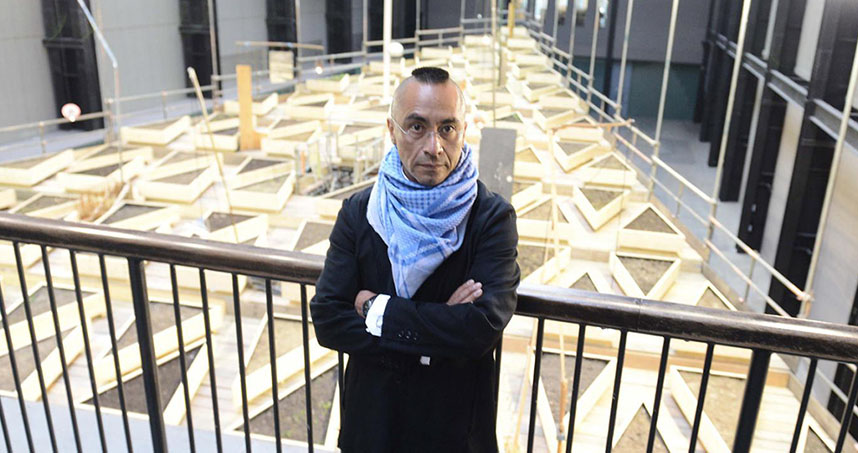Abraham Cruzvillegas Discusses Hope and Resourcefulness
The artist’s visit was a part of Northwestern Engineering’s Dean Seminar Series on October 24
Although artist Abraham Cruzvillegas grew up in Ajusco, one of Mexico City’s poorest neighborhoods, he rarely felt affected by the extreme poverty.
“We never talked about being poor,” he said. “We talked about resourcefulness and making something out of nothing.”
A part of Northwestern Engineering’s Dean’s Seminar Series, Cruzvillegas discussed how this resourcefulness became a common thread throughout his artistic works. Co-sponsored by the Mary and Leigh Block Museum of Art, the seminar took place Tuesday, October 25 in the Ford Motor Company Engineering Design Center.
During the event, Cruzvillegas discussed his recent installation, Empty Lot, in which something grew out of nothing. Unveiled in the Tate Modern’s giant Turbine Hall in 2015, the exhibition featured soil imported from 36 green spaces around London. Cruzvillegas watered the soil and exposed it to light but did not plant any vegetation or bury seeds. Then Cruzvillegas — and museum guests — watched as plants sprouted and grew. He shared a video, documenting the installation’s planning and construction.
“It’s a sculpture made out of hope; that would be the main material,” Cruzvillegas said in the video. “When I say that, it’s because transformation. Even in the worst conditions, you cannot lose hope because something can happen there. Something can happen here.”
Like many of his works, Cruzvillegas considers Empty Lot as a self-portrait. The seemingly barren soil represents Ajusco, and the hopeful plants that emerged symbolize his own growth. Empty Lot fits into Cruzvillegas’ “autoconstruccíon” (or “self-construction”) series, a theme he has pursued since 2007. In this context, autoconstruccíon has a double meaning: the works literally construct themselves by growing, and they are a metaphor for Cruzvillegas’ self-transformation.
Although Cruzvillegas was uncertain that vegetation would grow in the watered plots, he remained unfazed. Empty Lot is not a gardening project, he explained, but one about hope and wonder. “There are no mistakes,” he said. “Whatever happens is OK. If nothing happens, I will be happy because something is happening anyway.”
Cruzvillegas’s newest project, Water Trilogy, again looks to Ajusco for inspiration. Water is scarce in the neighborhood, requiring people to walk for miles to water pipes on the edge of Mexico City. Yet government officials threw away 300,000 liters of water, claiming it was wastewater. Protesters poured onto the streets and were met by police.
“These circumstances made me think about my own experiences, environment, and where I came from,” Cruzvillegas said. “I asked why it’s important to take a stand.”
Focused on Paris, Tokyo, and Rotterdam, Water Trilogy explores water in urban contexts, specifically including water scarcity and pollution. While planning the project, Cruzvillegas met with engineers, conservationists, ecologists, and anthropologists.
“I’m approaching people I would never have imagined,” he said. “I hope this happens always in my life.”
